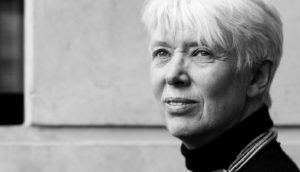18 February 1955 – 9 November 2014
With the insightful inaugural lecture “Intimate strangers,” Sarah van Walsum accepted her position as the chair of “migration law and family ties” on 7 June 2012 at the Vrije Universiteit of Amsterdam. She passed away way too early so she was unable to finish the work she started.
In her oration Sarah showed that the world looks completely different if you do not view it as ordered as traditional sovereign states with protected borders, but if you take the worldwide network of intimate family relations as a starting point for coherence. She pled for a constructive dialogue and intensive negotiation between these two perspectives. In this way the legitimate interest of states to regulate migration could be confronted with, for example, the pedagogical necessity to raise children in a family to harmonious individuals. The large-scaled research she could start in 2010 thanks to a NWO Vici grant aims to further elaborate these ideas. Four researchers – Jill Alpes, Younous Arbaoui, Nadia Ismaili and Johanne Sondergaard- therefore have the possibility to continue and build up further the research she started. Sarah mentored them even until she was bound to her sickbed.
The book The Family and the Nation: Dutch Family Migration Policies in the Context of Changing Family Norms (Cambridge Scholars Publishing, 2008) was groundbreaking. In the book Sarah describes the changes in Dutch migration law with use of the historical developments in the way the family is viewed between 1945-2000. Remarkable was that she found that while the view of the family became more and more liberal in national spheres, the family in migration law is still viewed very traditionally. The male provider of the family is still the dominant figure of the family in migration law, while in Dutch society this figure becomes less prominent. Sarah also showed convincingly that the way in which contact was being made between the Dutch colonials and the native people in the Dutch Colonies has left its footprints in the current migration policy.
A different aspect of her research about the relation between family and migration law was the positions of home carers and household service providers, most of the time irregular immigrant workers with a paltry position in labour law. “There is something remarkable going on here,” Sarah wrote in 2011 in the A&MR, “We don’t entrust the care of the house, child or elderly mother to just anyone. For these things we want people who are responsible , conscientious, capable, thorough and above all trustworthy. But as society we don’t grant these employees the most basic form of protection against dismissal and loss of income; in a lot of cases we don’t even grant them the right to open a bank account in their own name, to take health insurance or to rent a house. It is the incapability to act of the Dutch housewife until the 1950s, but then squared.”
Sarah knew migration from different perspectives. She grew up in a Dutch family in Canada, and studied sociology there. You can find that background in sociology in her work. When Sarah wanted to focus on migration she was advised to gain knowledge of the perspective of the migrant. She started to teach for a while at a school in Ghana. She came to the conclusion she had to settle somewhere. She choose to start studying migration law in the Netherlands. On 24 March 2000 Sarah got promoted at the Erasmus University of Rotterdam with the dissertation: “The shadow of the border. The Dutch foreigners law and the social security of Javanese Surinamese” (Kluwer, Deventer, 2000). Shortly after that she became a teacher at the Vrije Universiteit of Amsterdam where Thomas Spijkerboer started in 2000 as a professor of migration law. There she helped the young section of migration law to grow in multiple activities in the areas of education and research. From 2007-2012 she was PhD dean of the faculty of law.
See for more information about Sarah’s work www.sarahvanwalsum.net

photo: Kleis Kemperman